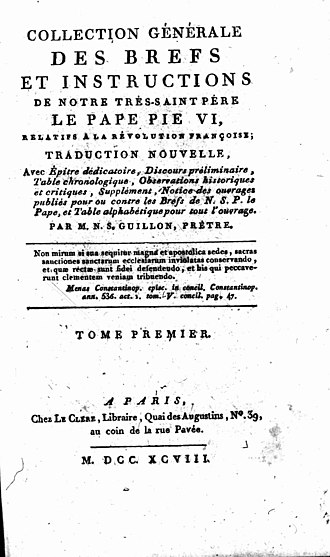Dechristianization of France during the French Revolution





== Dechristianization of France during the French Revolution ==
The Dechristianization of France during the French Revolution refers to the series of policies and actions taken by the revolutionary government to reduce the influence of the Roman Catholic Church and promote secularism in France. This movement was part of the broader French Revolution, which began in 1789 and sought to radically transform French society and government.
Background[edit]
The Ancien Régime in France was characterized by the close relationship between the Catholic Church and the monarchy. The Church held significant power and wealth, owning about 10% of the land and collecting tithes from the population. The First Estate, which included the clergy, enjoyed numerous privileges and was exempt from many taxes.
Early Revolutionary Measures[edit]
The National Assembly took several steps to curtail the power of the Church. In 1789, the Declaration of the Rights of Man and of the Citizen established the principles of equality and freedom of religion. In 1790, the Civil Constitution of the Clergy was enacted, which subordinated the Church to the state and required clergy to swear an oath of loyalty to the government. Many clergy refused, leading to a schism within the Church.
Radical Phase[edit]
The dechristianization campaign intensified during the Reign of Terror (1793-1794), led by the Committee of Public Safety under Maximilien Robespierre. Churches were closed, religious symbols were destroyed, and clergy were persecuted. The Cult of Reason and later the Cult of the Supreme Being were promoted as state-sponsored alternatives to Christianity.
Key Events[edit]
- **Confiscation of Church Property**: In 1789, the National Assembly nationalized Church lands to address the financial crisis.
- **Festival of Reason**: In 1793, the Notre-Dame Cathedral in Paris was transformed into a "Temple of Reason" and hosted a festival celebrating reason and liberty.
- **Abolition of the Gregorian Calendar**: In 1793, the revolutionary government introduced the French Republican Calendar, which removed religious holidays and replaced them with secular celebrations.
Impact and Legacy[edit]
The dechristianization campaign had a profound impact on French society. It led to widespread violence and persecution, alienated many devout Catholics, and contributed to the rise of counter-revolutionary movements. The Concordat of 1801 between Napoleon Bonaparte and Pope Pius VII eventually restored some stability by recognizing Catholicism as the religion of the majority of French citizens while maintaining state control over the Church.
Related Pages[edit]
Ad. Transform your life with W8MD's Budget GLP-1 injections from $49.99


W8MD offers a medical weight loss program to lose weight in Philadelphia. Our physician-supervised medical weight loss provides:
- Weight loss injections in NYC (generic and brand names):
- Zepbound / Mounjaro, Wegovy / Ozempic, Saxenda
- Most insurances accepted or discounted self-pay rates. We will obtain insurance prior authorizations if needed.
- Generic GLP1 weight loss injections from $49.99 for the starting dose of Semaglutide and $65.00 for Tirzepatide.
- Also offer prescription weight loss medications including Phentermine, Qsymia, Diethylpropion, Contrave etc.
NYC weight loss doctor appointmentsNYC weight loss doctor appointments
Start your NYC weight loss journey today at our NYC medical weight loss and Philadelphia medical weight loss clinics.
- Call 718-946-5500 to lose weight in NYC or for medical weight loss in Philadelphia 215-676-2334.
- Tags:NYC medical weight loss, Philadelphia lose weight Zepbound NYC, Budget GLP1 weight loss injections, Wegovy Philadelphia, Wegovy NYC, Philadelphia medical weight loss, Brookly weight loss and Wegovy NYC
|
WikiMD's Wellness Encyclopedia |
| Let Food Be Thy Medicine Medicine Thy Food - Hippocrates |
Medical Disclaimer: WikiMD is not a substitute for professional medical advice. The information on WikiMD is provided as an information resource only, may be incorrect, outdated or misleading, and is not to be used or relied on for any diagnostic or treatment purposes. Please consult your health care provider before making any healthcare decisions or for guidance about a specific medical condition. WikiMD expressly disclaims responsibility, and shall have no liability, for any damages, loss, injury, or liability whatsoever suffered as a result of your reliance on the information contained in this site. By visiting this site you agree to the foregoing terms and conditions, which may from time to time be changed or supplemented by WikiMD. If you do not agree to the foregoing terms and conditions, you should not enter or use this site. See full disclaimer.
Credits:Most images are courtesy of Wikimedia commons, and templates, categories Wikipedia, licensed under CC BY SA or similar.
Translate this page: - East Asian
中文,
日本,
한국어,
South Asian
हिन्दी,
தமிழ்,
తెలుగు,
Urdu,
ಕನ್ನಡ,
Southeast Asian
Indonesian,
Vietnamese,
Thai,
မြန်မာဘာသာ,
বাংলা
European
español,
Deutsch,
français,
Greek,
português do Brasil,
polski,
română,
русский,
Nederlands,
norsk,
svenska,
suomi,
Italian
Middle Eastern & African
عربى,
Turkish,
Persian,
Hebrew,
Afrikaans,
isiZulu,
Kiswahili,
Other
Bulgarian,
Hungarian,
Czech,
Swedish,
മലയാളം,
मराठी,
ਪੰਜਾਬੀ,
ગુજરાતી,
Portuguese,
Ukrainian